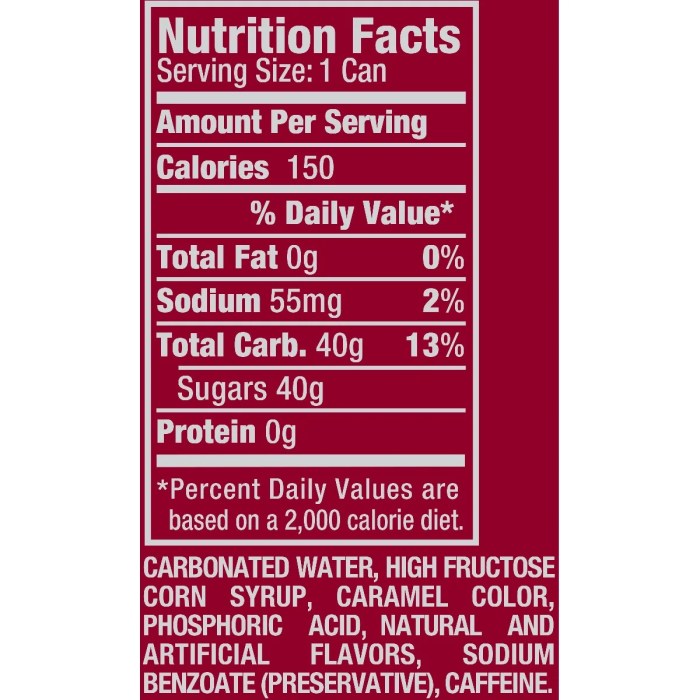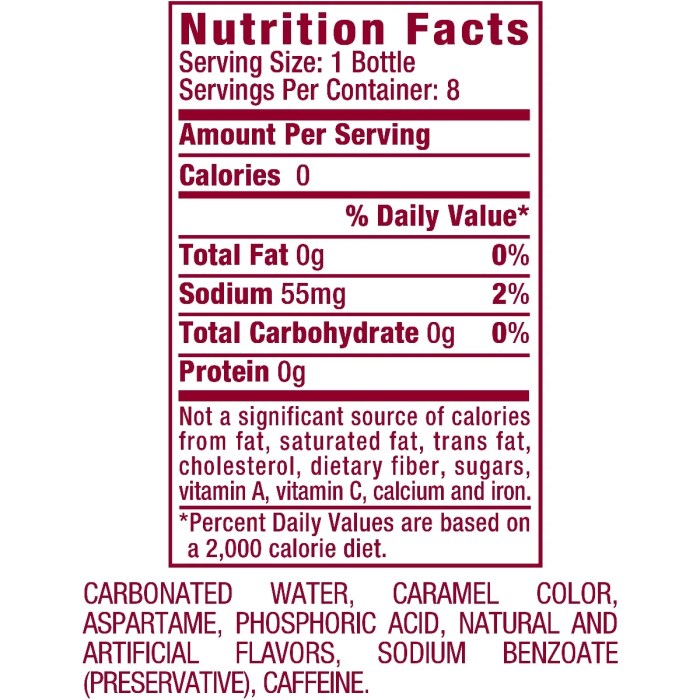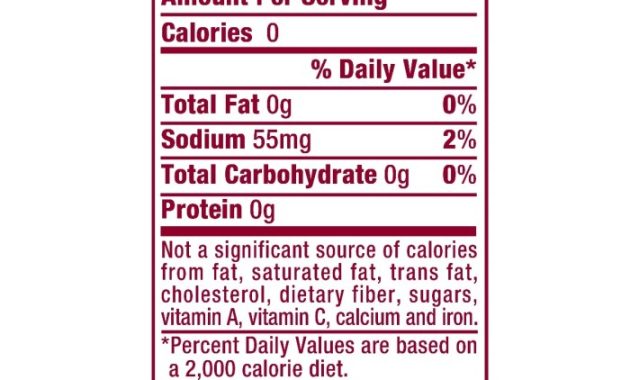Dr Pepper Nutritional Content Overview: Dr Pepper Nutrition Facts

Dr pepper nutrition facts – Dr Pepper, a popular caffeinated soft drink, has a distinct flavor profile that sets it apart from other cola beverages. Understanding its nutritional content is crucial for making informed choices about consumption. This section provides a concise overview of the key nutritional components in a standard serving of Dr Pepper and compares it to other popular soft drinks.
A typical 12-ounce serving of Dr Pepper contains a significant amount of sugar and calories, with relatively little in the way of vitamins or minerals. The exact amounts can vary slightly depending on the manufacturing process and location, but generally, it’s characterized by a high sugar content and a moderate caffeine level.
Nutritional Values Comparison
Comparing Dr Pepper’s nutritional profile to other popular soft drinks reveals some interesting trends. While the exact values differ across brands and specific product variations (diet versions, for instance), Dr Pepper generally falls within the range of other cola and non-cola soft drinks in terms of caloric and sugar content. However, it often contains a higher level of caffeine than some competitors.
Dr Pepper’s nutritional profile is often debated, with high sugar content being a primary concern. For those seeking a higher-protein, lower-sugar alternative, understanding the nutritional breakdown of other foods is crucial. A helpful resource for comparing options is a detailed look at cottage cheese nutrition facts , which can help you make informed choices about your diet.
Returning to Dr Pepper, it’s important to consider its place within a balanced nutritional plan.
Diet versions typically reduce the calorie and sugar content significantly, but may include artificial sweeteners.
Dr Pepper Nutritional Information
The following table summarizes the nutritional information for a standard 12-ounce serving of Dr Pepper. Note that these values are approximate and may vary slightly.
| Serving Size | Calories | Total Sugars (grams) | Caffeine (mg) |
|---|---|---|---|
| 12 fl oz (355 ml) | 150 | 41 | 41 |
Serving Sizes and Calorie Counts

Understanding serving sizes and their corresponding calorie counts is crucial for managing your daily caloric intake. Dr Pepper, like other carbonated soft drinks, contains a significant amount of sugar, directly impacting its calorie content. This section will detail the calorie information for various serving sizes and illustrate how this contributes to overall daily caloric needs.
The calorie count in Dr Pepper varies depending on the serving size. A standard serving size is typically considered to be 12 fluid ounces (355 ml). However, different sizes are readily available, leading to varying calorie intakes.
Calorie Counts for Different Serving Sizes of Dr Pepper
| Serving Size (fl oz) | Serving Size (ml) | Approximate Calories |
|---|---|---|
| 8 | 237 | 100-110 |
| 12 | 355 | 150-160 |
| 16 | 473 | 200-220 |
| 20 | 591 | 250-275 |
Note: Calorie counts can vary slightly depending on the specific Dr Pepper formulation and manufacturing process. These figures represent approximate values.
Dr Pepper Calorie Intake and Daily Caloric Needs, Dr pepper nutrition facts
The average adult’s daily caloric needs vary greatly depending on factors such as age, sex, activity level, and metabolism. However, a common range is between 2000 and 2500 calories. Consuming a single 20-ounce bottle of Dr Pepper (approximately 250-275 calories) can represent a significant portion (10-13%) of a person’s daily caloric intake, depending on their individual needs. Regular consumption of such sugary drinks can easily contribute to excess calorie intake, potentially leading to weight gain.
For example, a person aiming for a 2000-calorie diet who drinks two 12-ounce servings of Dr Pepper daily (approximately 300-320 calories) is already consuming 15-16% of their total daily calories from this single beverage. This leaves less room for nutritious foods needed for optimal health.
Calorie Density Comparison with Other Sugary Drinks
Dr Pepper’s calorie density is comparable to other carbonated sugary drinks. While precise values can fluctuate between brands and formulations, similar serving sizes of other sodas like Coca-Cola or Pepsi generally contain a comparable number of calories. Other sugary drinks like fruit juices, sweetened teas, and energy drinks also often possess high calorie densities, contributing significantly to daily caloric intake if consumed frequently.
For instance, a 12-ounce serving of many fruit juices can easily contain 150-180 calories, similar to Dr Pepper. This highlights the importance of mindful consumption of sugary beverages across the board to manage overall calorie intake and maintain a healthy lifestyle.
Common Queries
Is Dr Pepper suitable for diabetics?
Due to its high sugar content, Dr Pepper is generally not recommended for individuals with diabetes. Diabetics should consult their doctor or a registered dietitian for personalized guidance on beverage choices.
Does Dr Pepper contain gluten?
Generally, Dr Pepper does not contain gluten. However, always check the ingredient list on the specific product to ensure it aligns with your dietary needs.
What are the long-term effects of regular Dr Pepper consumption?
Regular consumption of sugary drinks like Dr Pepper can contribute to weight gain, increased risk of type 2 diabetes, and other health problems. Moderation is key.
Are there any alternatives to Dr Pepper with lower sugar content?
Yes, several diet or zero-sugar versions of Dr Pepper and other similar beverages are available on the market. However, always check the ingredient list and nutritional information to ensure they meet your dietary needs.

